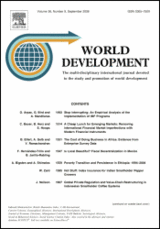External publications

Partisan alignment and political corruption: evidence from a new democracy
Stöcker, AlexanderExternal Publications (2022)
in: World Development 152, article 105805
DOI: https://doi.org/10.1016/j.worlddev.2021.105805
Information
I analyze the link between partisan alignment of local politicians and the incidence of political corruption, using novel hand-collected data on local political corruption in Ghana. The empirical analysis, based on 205 districts observed over the period 2013–2018, suggests significantly lower levels of political corruption in aligned districts. Partisan alignment reduces corruption by 1.9 percentage points, equivalent to about half of the mean-level in non-aligned districts. In line with political ambition theory, I attribute this result to local politicians aligned with the national government having incentives to control fiscal irregularities within their localities in order to appease their national party leaders and preserve their party’s reputation. Alternative explanations are considered through empirical means and can be excluded. The estimated effect is more pronounced in districts that (i) are party strongholds, (ii) have better financial endowments, and (iii) have female local parliamentarians. It appears that political centralization and a politicized bureaucracy, as observed in Ghana, are important explanations for this finding.
Contact
Cornelia Hornschild
Publication Coordinator
E-mail Cornelia.Hornschild@idos-research.de
Phone +49 (0)228 94927-135
Fax +49 (0)228 94927-130
Alexandra Fante
Librarian/ Open Access Coordinator
E-Mail Alexandra.Fante@idos-research.de
Telefon +49 (0)228 94927-321
Fax +49 (0)228 94927-130



![[Translate to English:] Photo: Alexandra Fante, Bibliothekarin/Open Access-Koordinatorin](/fileadmin/_processed_/f/0/csm__c_Deutsches-Institut-fuer-Entwicklungspolitik_Fante_94ce4fa1ba.jpg)